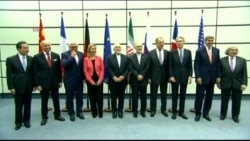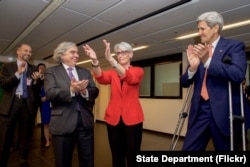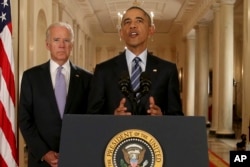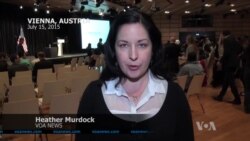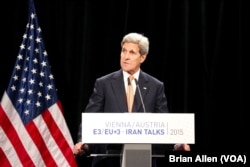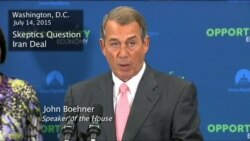World powers have reached a deal with Iran that will limit the country's nuclear program in exchange for eased economic sanctions, ending more than a decade of tempestuous negotiations.
“This is the good deal we had sought,” U.S. Secretary of State John Kerry, who spearheaded recent efforts by the P5+1 countries to broker an accord, told a packed news conference in Vienna on Tuesday.
Key Points of Iran Nuclear Accord
Key Points of the Iran Nuclear Deal
- Iran will reduce stockpile of low-enriched uranium by 98 percent to 300 kg for 15 years
- Iran will reduce by two-thirds the number of centrifuges operating to enrich uranium at its main processing center
- Iran is prevented from designing warheads or conducting experiments on nuclear weapons-related technology.
- Arms embargo on Iran will be eased, as long as IAEA judges Iran's nuclear program to be peaceful.
- International sanctions on Iran will be lifted, enabling it to export oil.
- If an international panel finds Iran is not honoring the accord, it can vote to restore sanctions.
After nearly three weeks of meetings, EU foreign affairs chief Federica Mogherini stood beside Iranian foreign minister Javad Zarif to announce the agreement, which will cut back Tehran's nuclear program and require oversight by the U.N. nuclear agency.
The deal will limit Iran's potential development of nuclear weapons while allowing the country to maintain a civilian atomic program, dramatically scaling back the number of Tehran's advanced centrifuges by two-thirds, according to senior U.S. Administration officials.
Like Kerry and Mogherini, the Iranian foreign minister also spoke of the deal as a new diplomatic beginning for the countries involved, calling it “not a ceiling but a solid foundation.”
“We must now begin to build on it,” he posted to Twitter after Tuesday’s news conference.
Looking forward
Under economically crippling economic sanctions, Iran’s strained diplomatic relations with the U.S. and the Western countries involved in the talks – Britain, France, and Germany – and the demands by negotiatiors on both sides at times threatened to thwart the Vienna talks.
One contentious point – access by monitors to Iran’s nuclear sites – was ultimately addressed with the creation of a mechanism that will allow the U.N. to push for entry, but that gives Iran the right to challenge the request through arbitration.
The deal also addresses U.N. embargos on conventional weapons, which Iran – backed by Russia - sought to remove. It upholds the arms ban for five more years and the missile ban for eight, but could end earlier if the IAEA determines Iran complied with the terms of the nuclear deal, which includes dismantling any current work toward nuclear weapons – a charge Tehran has repeatedly denied.
In exchange, P5+1 countries agreed to lift economic sanctions on the country, in part by unfreezing billions of dollars in assets abroad as soon as Iran complies with the requirements of the nuclear agreement.
Presidents react
"This deal demonstrates that American diplomacy can bring about real and meaningful change,” U.S. President Barack Obama said Tuesday morning from Washington, as the announcement concluded in Vienna.
"This deal offers an opportunity to move in a new direction. We should seize it," he said, adding that he would veto any legislation in the U.S. Congress that would block the agreement.
In a televised address, Iranian President Hassan Rouhani praised the agreement as well, saying "a new chapter" had begun in the country’s foreign relations.
WATCH: VOA's Heather Murdock reports from Vienna
Last minute scramble
The Vienna talks began in late June, trampling three deadlines and exhausting both the diplomats. The international press corps following the talks so closely reporters would shout questions up to Javad Zarif as he took work breaks on the balcony of the Palais Coburg.
By last weekend, with the latest deadline looming, the mood swung depending on the answers from the terrace, the cloud coverage in the city, and any snippets of information gleaned from the P5+1 diplomats as they arrived and left from the hotel.
The last full day – the deadline of June 13 – began and ended with high-level meetings at the Coburg.
Senior administration officials described a late-night phone call from the Secretary of State to President Obama, and a moment in the talks when Zarif, Mogherini and Kerry asked all their staff to leave the negotiations table to confer alone on the final details of the agreement.
By the end of the night, as the deal was largely finalized, negotiators were too exhausted for a “triumphant” celebration, a senior U.S. official said.
Obstacles ahead
Tuesday's agreement represents a historic compromise after a 12-year standoff that has, at times, threatened to provoke a new conflict in the Middle East. It will take effect only after it clears several hurdles in Washington as well as Tehran. Conservatives in both capitals have fought against making the compromises needed to reach the agreement.
The greatest hurdle will be the U.S. Congress, where Republicans have a majority and are expected to vote against the deal after a review period of up to 60 days. President Barack Obama is expected to veto any negative vote.
Fielding questions about a potential opposition vote in Congress, and Iran’s ability to follow the accord, Secretary Kerry said he felt confident lawmakers would not oppose the accord, which Mogherini said would be made public in its entirety on Tuesday.
“We have put in place ample mechanisms with respect to compliance, and respect to accountability,” he said. “I feel very confident about our ability to protect our interests."
But Kerry also warned that “if Iran fails in a material way to live up" to its commitments under the agreement, sanctions "will snap right back into place."
Meanwhile Tuesday, Iran and the U.N.'s nuclear watchdog signed an agreement aimed at answering questions about possible military dimensions to Iran's nuclear program.
The International Atomic Energy Agency has tried for years to get answers in its probe, including access to the Parchin military site, but has faced resistance from Iran.
IAEA chief Yukiya Amano said the roadmap of expert meetings and items involving Parchin should allow him to issue a report with the agency's final assessment by the middle of December.
"This is a significant step forward towards clarifying outstanding issues regarding Iran's nuclear program," he said.
VOA's Chris Hannas contributed to this report.




